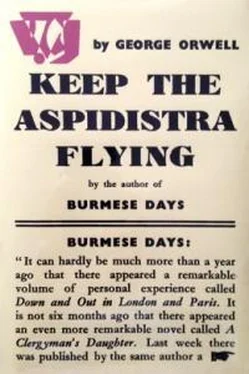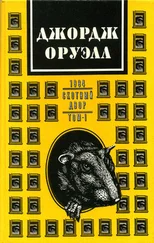From his earliest childhood Gordon's relatives had depressed him horribly. When he was a little boy he still had great numbers of uncles and aunts living. They were all more or less alike—grey, shabby, joyless people, all rather sickly in health and all perpetually harassed by money–worries which fizzled along without ever reaching the sensational explosion of bankruptcy. It was noticeable even then that they had lost all impulse to reproduce themselves. Really vital people, whether they have money or whether they haven't, multiply almost as automatically as animals. Gran'pa Comstock, for instance, himself one of a litter of twelve, had produced eleven progeny. Yet all those eleven produced only two progeny between them, and those two—Gordon and his sister Julia—had produced, by 1934, not even one. Gordon, last of the Comstocks, was born in 1905, an unintended child; and thereafter, in thirty long, long years, there was not a single birth in the family, only deaths. And not only in the matter of marrying and begetting, but in every possible way, NOTHING EVER HAPPENED in the Comstock family. Every one of them seemed doomed, as though by a curse, to a dismal, shabby, hole–and–corner existence. None of them ever DID anything. They were the kind of people who in every conceivable activity, even if it is only getting on to a bus, are automatically elbowed away from the heart of things. All of them, of course, were hopeless fools about money. Gran'pa Comstock had finally divided his money among them more or less equally, so that each received, after the sale of the red–brick mansion, round about five thousand pounds. And no sooner was Gran'pa Comstock underground than they began to fritter their money away. None of them had the guts to lose it in sensational ways such as squandering it on women or at the races; they simply dribbled it away and dribbled it away, the women in silly investments and the men in futile little business ventures that petered out after a year or two, leaving a net loss. More than half of them went unmarried to their graves. Some of the women did make rather undesirable middle–aged marriages after their father was dead, but the men, because of their incapacity to earn a proper living, were the kind who 'can't afford' to marry. None of them, except Gordon's Aunt Angela, ever had so much as a home to call their own; they were the kind of people who live in godless 'rooms' and tomb–like boarding–houses. And year after year they died off and died off, of dingy but expensive little diseases that swallowed up the last penny of their capital. One of the women, Gordon's Aunt Charlotte, wandered off into the Mental Home at Clapham in 1916. The Mental Homes of England, how chock–a–block they stand! And it is above all derelict spinsters of the middle– classes who keep them going. By 1934 only three of that generation survived; Aunt Charlotte already mentioned, and Aunt Angela, who by some happy chance had been induced to buy a house and a tiny annuity in 1912, and Uncle Walter, who dingily existed on the few hundred pounds that were left out of his five thousand and by running short–lived 'agencies' for this and that.
Gordon grew up in the atmosphere of cut–down clothes and stewed neck of mutton. His father, like the other Comstocks, was a depressed and therefore depressing person, but he had some brains and a slight literary turn. And seeing that his mind was of the literary type and he had a shrinking horror of anything to do with figures, it had seemed only natural to Gran'pa Comstock to make him into a chartered accountant. So he practised, ineffectually, as a chartered accountant, and was always buying his way into partnerships which were dissolved after a year or two, and his income fluctuated, sometimes rising to five hundred a year and sometimes falling to two hundred, but always with a tendency to decrease. He died in 1922, aged only fifty–six, but worn out— he had suffered from a kidney disease for a long time past.
Since the Comstocks were genteel as well as shabby, it was considered necessary to waste huge sums on Gordon's 'education'. What a fearful thing it is, this incubus of 'education'! It means that in order to send his son to the right kind of school (that is, a public school or an imitation of one) a middle–class man is obliged to live for years on end in a style that would be scorned by a jobbing plumber. Gordon was sent to wretched, pretentious schools whose fees were round about 120 pounds a year. Even these fees, of course, meant fearful sacrifices at home. Meanwhile Julia, who was five years older than he, received as nearly as possible no education at all. She was, indeed, sent to one or two poor, dingy little boarding schools, but she was 'taken away' for good when she was sixteen. Gordon was 'the boy' and Julia was 'the girl', and it seemed natural to everyone that 'the girl' should be sacrificed to 'the boy'. Moreover, it had early been decided in the family that Gordon was 'clever'. Gordon, with his wonderful 'cleverness', was to win scholarships, make a brilliant success in life, and retrieve the family fortunes—that was the theory, and no one believed in it more firmly than Julia. Julia was a tall, ungainly girl, much taller than Gordon, with a thin face and a neck just a little too long—one of those girls who even at their most youthful remind one irresistibly of a goose. But her nature was simple and affectionate. She was a self–effacing, home–keeping, ironing, darning, and mending kind of girl, a natural spinster– soul. Even at sixteen she had 'old maid' written all over her. She idolized Gordon. All through his childhood she watched over him, nursed him, spoiled him, went in rags so that he might have the right clothes to go to school in, saved up her wretched pocket– money to buy him Christmas presents and birthday presents. And of course he repaid her, as soon as he was old enough, by despising her because she was not pretty and not 'clever'.
Even at the third–rate schools to which Gordon was sent nearly all the boys were richer than himself. They soon found out his poverty, of course, and gave him hell because of it. Probably the greatest cruelty one can inflict on a child is to send it to school among children richer than itself. A child conscious of poverty will suffer snobbish agonies such as a grown–up person can scarcely imagine. In those days, especially at his preparatory school, Gordon's life had been one long conspiracy to keep his end up and pretend that his parents were richer than they were. Ah, the humiliations of those days! That awful business, for instance, at the beginning of each term, when you had to 'give in' to the headmaster, publicly, the money you had brought back with you; and the contemptuous, cruel sniggers from the other boys when you didn't 'give in' ten bob or more. And the time when the others found out that Gordon was wearing a ready–made suit which had cost thirty–five shillings! The times that Gordon dreaded most of all were when his parents came down to see him. Gordon, in those days still a believer, used actually to pray that his parents wouldn't come down to school. His father, especially, was the kind of father you couldn't help being ashamed of; a cadaverous, despondent man, with a bad stoop, his clothes dismally shabby and hopelessly out of date. He carried about with him an atmosphere of failure, worry, and boredom. And he had such a dreadful habit, when he was saying good–bye, of tipping Gordon half a crown right in front of the other boys, so that everyone could see that it was only half a crown and not, as it ought to have been, ten bob! Even twenty years afterwards the memory of that school made Gordon shudder.
The first effect of all this was to give him a crawling reverence for money. In those days he actually hated his poverty–stricken relatives—his father and mother, Julia, everybody. He hated them for their dingy homes, their dowdiness, their joyless attitude to life, their endless worrying and groaning over threepences and sixpences. By far the commonest phrase in the Comstock household was, 'We can't afford it.' In those days he longed for money as only a child can long. Why SHOULDN'T one have decent clothes and plenty of sweets and go to the pictures as often as one wanted to? He blamed his parents for their poverty as though they had been poor on purpose. Why couldn't they be like other boys' parents? They PREFERRED being poor, it seemed to him. That is how a child's mind works.
Читать дальше








